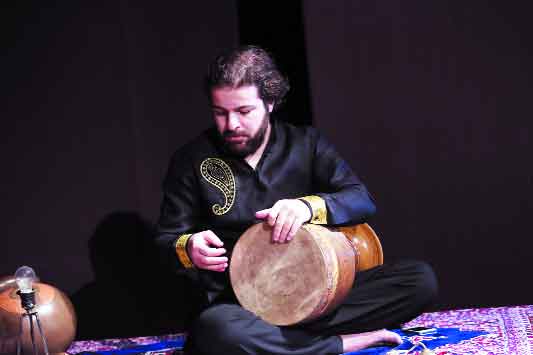Iranian percussionist Fakhroddin Ghaffari calls Delhi his second home, not just because he has stayed here for long but because of his country’s common cultural linkages, says Saimi Sattar
Inherently, music and art are not entertainment,” believes Fakhroddin Ghaffari, the Iranian percussionist who performed at the 13th edition of the Holi Moo, a multi-genre festival that celebrates the advent of spring with colours, music and entertainment. For those, who look at this performing art primarily as a source of entertainment, the artist believes that there is a section that answers to the description. “This is not bad, no music is. But every kind of music exists because there is a story to tell. However, art and music are for enlightening and awakening as there is a much deeper philosophy and thought process behind it rather than just entertainment,” says the artist who is pursuing a Ph.D in Indian classical music which he says took hundreds of years to reach its cultural finesse. He says, “Music and art are connected to a deep culture that aims to make the world a better place. It is primarily important for the message that it delivers,” he says.
Arts and music form an important part of Ghaffari’s life as he has imbibed them at a young age from his surroundings. “My parents, uncles, grandparents and aunts are painters, sculptors, calligraphy artists and more. My grandfather is a chef and a musician. I’ve been learning music since I was five under the guru shishya parampara from my uncle who is a musician. I was blessed to be born in the environment,” he says.
Ghaffari often works on collaborations. Though he comes from the Persian classical tradition and has done his graduation and Masters in Indian music, he believes that for any joint performance to be successful, each artist should be firmly rooted to their respective traditions. “One needs a considerable depth and understanding of melody when you collaborate as you have to think out-of-the-box. Collaborations help creative people and are a big learning experience,” he says.
Interestingly, he has worked with not just people from different musical genres but also from different fields. “While a play was being performed in a theatre, I too was on stage performing live. I’ve worked with silent movies,” he says.
However, working with a person from an altogether different genre or field can be a challenging prospect. Ghaffari says, “Sometimes it is difficult if you are not flexible and insist that I am an Iranian or Indian classical music performer. Things can get difficult then. There will be a clash if you insist that Maine ye hi seekha main yahi bajaunga,” he says in accented Hindi. He believes that two people, who are collaborating, need to reach out to each other until they are in a common space. “You can’t expect one to bend over all the way. You have to take a step forward and meet in the middle point. It is a deep learning experience,” he adds.
Ghaffari decided to be a part of the festival as the organisers are his friends. “I can see how much hard work and honesty they are putting into it. The festival is all about getting together and being one. I played during it last year as well. This time, along with a friend, Mohit Lal, I curated the opening act of the World Music Stage,” he says.
Not many people might know that the percussionist calls the capital his second home as he grew up here. “I came here when I was 14 and have been here since then. It is my first home rather than my second as I spent crucial teenage years when people form their personality in Delhi,” he says.
And it is not just that he has stayed here for long, but a common thread that binds the place with Iran. He believes that, “There is so much similarity between India and Iran that anyone who hasn’t even been to the other country or heard the music there would still feel at home. The masala may be different but the food is the same.”
Having stayed in the city for a long time, he feels passionately. “It is a city that needs to be cared for and cherished, but that is not happening. Delhi is a city, where no matter where you are standing or whichever direction you look, there is a sign of heritage, culture and what not. Delhi has been an international cultural hub between 1600 and 1800. It has seen great days and while the government is trying to do its bit, the people can do better. The city is not liveable any more as for some months in a year, you can barely breathe. It is sad and it is making me question my stay here. I don’t like thinking this way,” he says quietly.


























